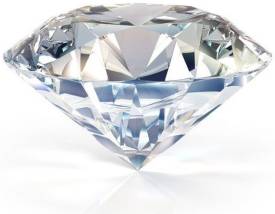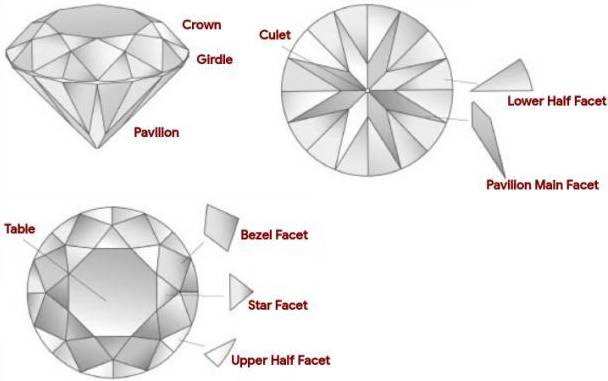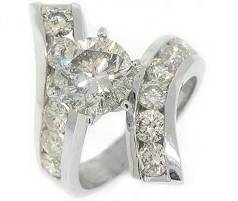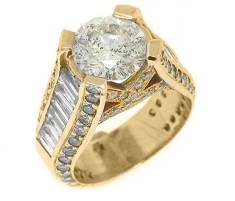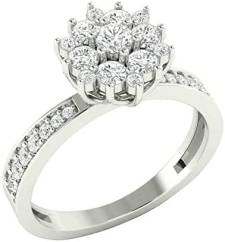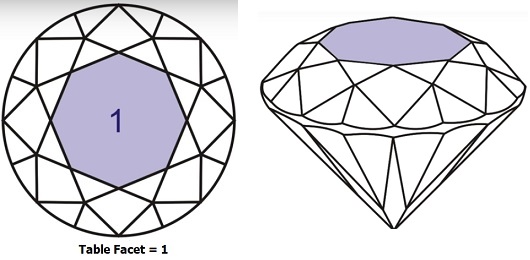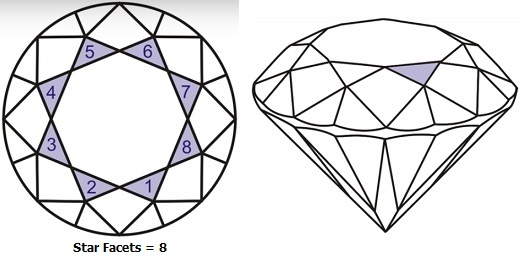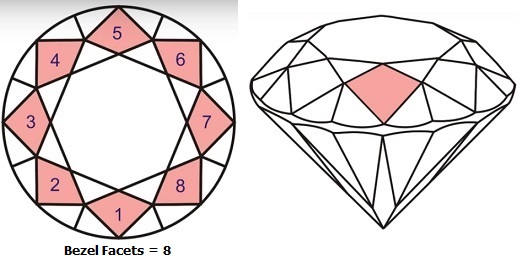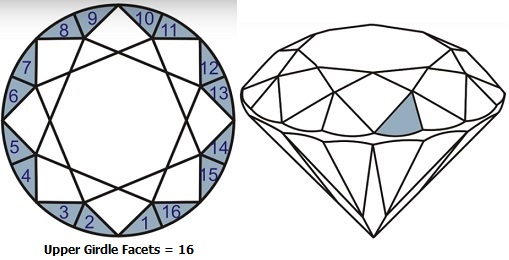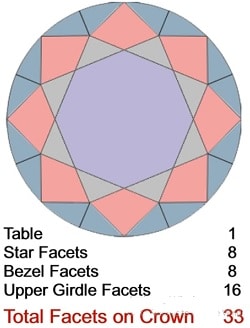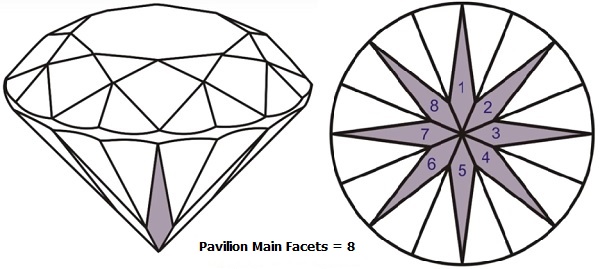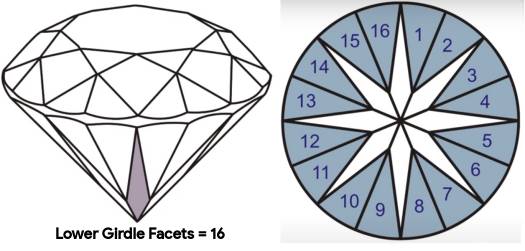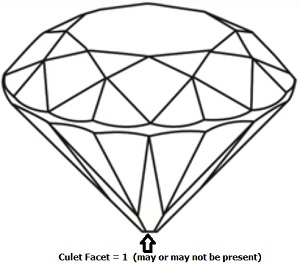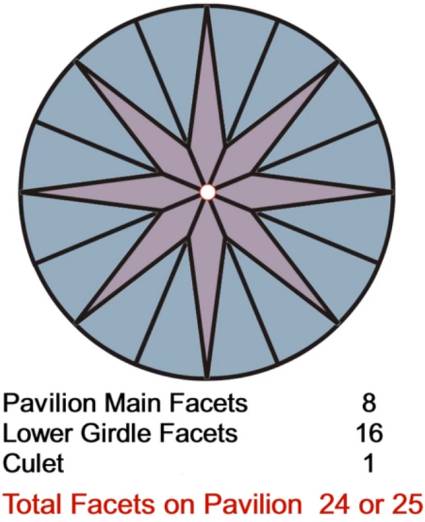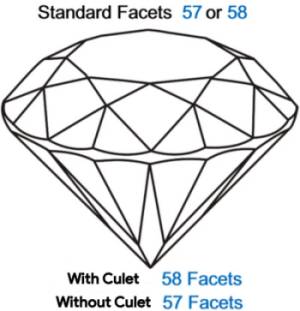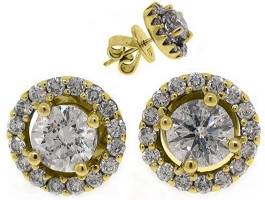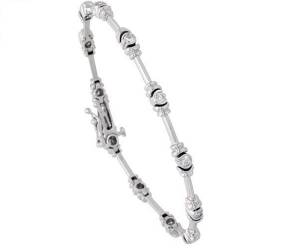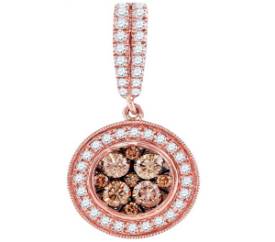Round Brilliant Diamond: The Most Desired Diamond Cut & Shape.
How popular is this shape? Well, up to three-quarters of all diamond jewelry buyers choose this diamond. The shape is coveted for its unparalleled brilliance and fire. And why not? The scintillating stones you see today are the product of the cumulative knowledge of six centuries of diamond sculptors.
A Round Brilliant Diamond
The cut has evolved through a number of trials and errors. Various permutations of sizes and proportions have been tested and analyzed by successive generations of gem-cutters to arrive at this near-perfect cut. The culet size, the table size, the total depth, the crown height, the length of the facets et al have been tinkered and experimented with to maximize play of light by the diamond.
Arrangement of Facets in a Round Brilliant Diamond
As knowledge and technology advanced over time, diamond cutting techniques became more refined. And moving with the times, lapidaries have been carving larger table facets and smaller culets. Also, they are sculpting longer star facets and longer lower half facets. Each successive refinement to the cut bestowed its own look to the diamond of the time. This is why round diamonds from different time periods exhibit distinct looks characteristic to their era.
Certain conspicuous phases of this transition can be identified as follows. The old European cut was prevalent by 1750. The intervening “transitional” brilliant was in existence close to 1880. The modern brilliant appeared during the 1950s.
Upon tilting or rocking, the older-style gems show a different face-up pattern of light and dark as compared to a brilliant cut of the present day.
Click On The Images
The evolving cutting style favored a particular set of proportions at particular points in time. And each set of proportions presented its own face-up pattern. We also know that fashions and acceptable notions of beauty change with time. As such, the cut proportions of many beautiful but old diamonds differ from today’s prevailing conventions.
That being so, gemstone grading laboratories like the GIA face a dilemma while deciding the grade of such diamonds. This is because these diamonds do not conform to today’s yardstick of beauty. Nevertheless, there is a niche market for such diamonds among buyers who love vintage and antique jewelry styles.
0.85 Ct Solitaire Diamond Engagement Ring 14K White Gold Over
Click On The Image
The Gemological Institute of America (GIA) founded the cut-grading system for round brilliant diamonds in the year 2005. While doing so, GIA coined the term, “unmodified round brilliant”. This term was applied to a symmetrical round cut with an array of 58 facets, cut to modern standards. The aforesaid system is an outcome of many years of meticulous research. It included a scrupulous study of the taste and preferences of a vast variety of interest groups such as jewelers, gem-cutters, and jewelry buyers.
Under this system, GIA assigns cut-grade to such diamonds based on contemporary conventions. The grades are derived from the analysis of proportions that yield the best combination of brightness, fire, scintillation, and pattern. The five grades are Excellent, Very Good, Good, Fair, and Poor.
The 58 facets (including the culet) grant immense benefits to this cut. The angle and size of every facet have been precisely calculated. The well-calculated facet positions ensure optimum play of light inside the diamond. The result is a stunning, scintillating stone. The slightest movement of the stone or your eye scatters and refracts light creating a dazzling display of brilliance and fire.
The facet placement on this diamond is as follows:
Round Brilliant Diamond Table Facet
Round Brilliant Diamond Star Facets
Bezel Facets
Round Brilliant Diamond Upper Girdle Facets
Round Brilliant Diamond Total Crown Facets
Pavilion Main Facets
Round Brilliant Diamond Lower Girdle Facets
Round Brilliant Diamond Culet Facet
Round Brilliant Diamond Total Facets on Pavilion
Round Brilliant Diamond Total Facets
Jewelry designers use the round diamond in all types of jewelry pieces like all types of rings including wedding and engagement rings, earrings, necklaces, bracelets et al.
The allure of these diamonds arises from the following reasons.
1.78 Carat Diamond Stud Earrings
Click On The Image
Brilliance: The scientifically calculated proportions and facet placement of round brilliant diamond reflect more white light than any other cut. This confers maximum brilliance to this diamond cut.
Fire: The same skillfully placed facets also break a portion of white light into its constituent colors. The term ‘fire’ refers to the quantum of colored light that is dispersed by the diamond. When this diamond has an excellent cut, it displays a fabulous fire not equaled by any other cut.
Beauty: Brilliance and fire are what makes a diamond beautiful. When other attributes are similar, the maximum brilliance and maximum fire of this diamond make it the most beautiful of all diamond cuts.
14k White Gold (4 mm wide) 7 Inches Tennis Bracelet, With 12 Round Brilliant Diamonds
Click On The Image
Versatility: The round brilliant diamond is blessed with beauty and looks that go with all types of jewelry. It adorns rings, earrings, bracelets, brooches, etc with a lot of aplomb. The diamond also graces all types of attires and occasions in style.
If you are in doubt go for a brilliant round cut diamond. It won’t fail you.
1.00ctw Champagne Cognac Brown and White Brilliant Round Cut Diamond Pendant
Click On The Image
See More Diamond Shapes as Follows:
| Baguette Diamonds | Marquise Diamond |
| Princess Cut Diamonds | Asscher Cut Diamond |
| Emerald Cut Diamond | Diamond Shape |
